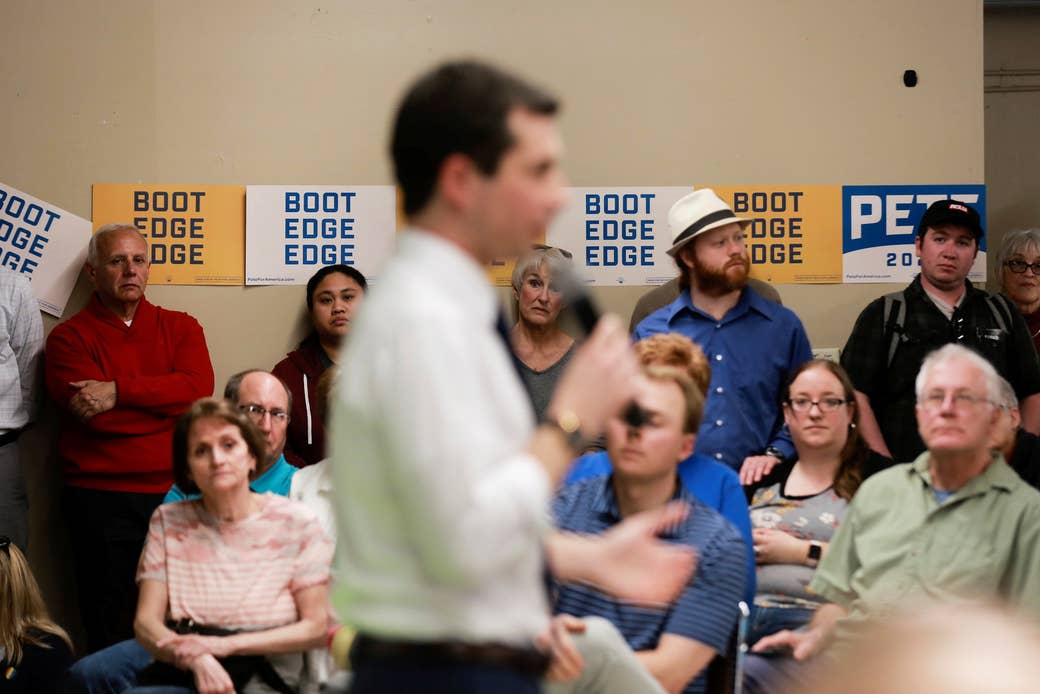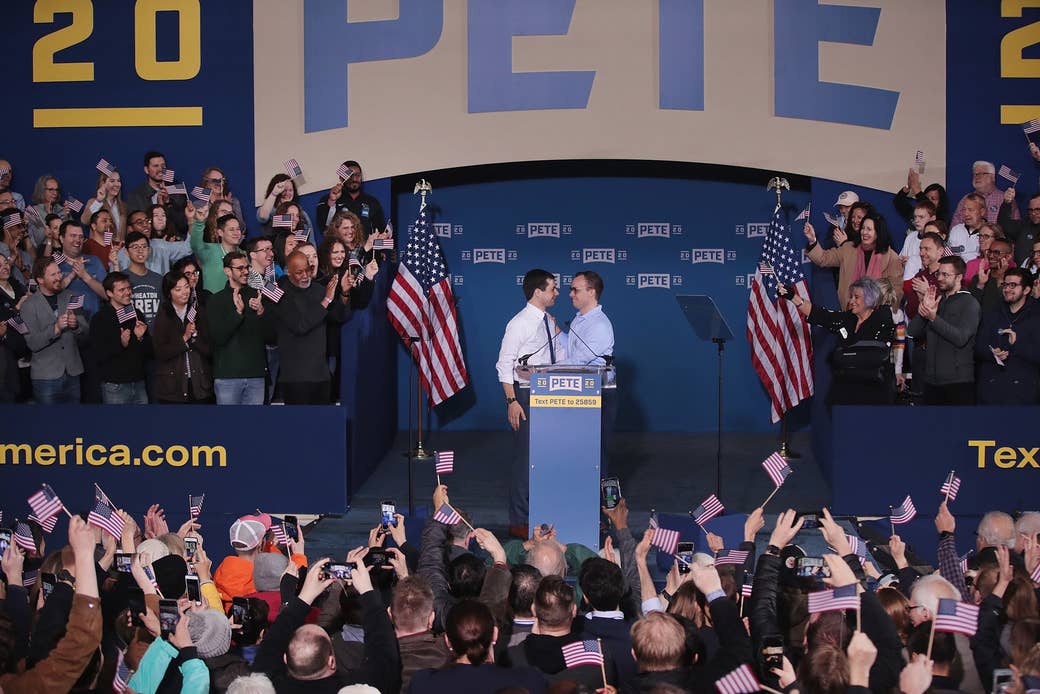
ADEL, Iowa — It doesn’t matter to anyone, not at all, that Pete Buttigieg is gay.
Democratic voters here like “Mayor Pete” for his intelligence, his relatability, his down-to-earthness. When it comes to his sexuality, dozens of them gave the same answer, one after another: “It doesn’t matter to me.”
In some Democratic circles, the idea has become close to orthodoxy: Buttigieg’s sexuality is irrelevant, especially among Democratic voters, a background issue at best in the South Bend mayor’s unlikely bid for president.
“I’m not sure it’s even an issue in the Bible Belt now,” one voter in Dubuque said.
But there is evidence that anti-gay bias is still likely to be a strong force in the 2020 election — in the primary, particularly as it winds through the American South, and in the general election, if Buttigieg becomes the Democratic nominee.
Nearly 30% of Democratic voters believe it is “always wrong” for “same-sex adults to have sexual relations,” a 2018 poll found. In a poll just last month, 86% of Democrats and left-leaning independents said they are “open” to electing a gay male president — but a majority said they didn’t think the country was ready.
That’s a stark contrast to 2007, when most voters said they thought the country was ready for a black president, and in 2015, when most voters said the country was “ready” for a woman.
As Buttigieg campaigned in Iowa last weekend, there were signs that anti-gay bias has faded significantly from American politics: Voters spoke admiringly of Buttigieg’s “family values” and “morals” and called the prospect of a gay president “a breath of fresh air.” Two young women in Iowa City asked Buttigieg staffers, breathlessly, if his husband Chasten was in the audience — they were hoping to meet him.
But there were other signs too.
Asked about Buttigieg’s sexuality, Jane, a retired social worker in Waukee who did not want her last name used, paused her gushing praise for the young mayor.
“Um… I don’t know if I should answer that or not,” she said, putting her hand to her chest. “I’ve heard him talk, and I like him, and I really support him. But I’m concerned that we might not be able to bring as many people to vote in the general election.”
Right now, Jane said, “I’m trying not to think about that.” She likes Buttigieg for other reasons, things she thinks could help him get elected: “He’s real, he speaks from the heart, he tells you his story. He’s honest.”
In a primary election currently dominated by questions of “electability,” and which Democrats are most likely to beat President Donald Trump, that reality could matter to voters. Democrats have routinely told pollsters that the thing they care most about in a candidate is their ability to beat Trump.
In polls that measure the gap between Democrats’ first choice and who they think has the “best chance” to beat Trump, it’s Buttigieg who sees the biggest gulf: Compared to Sens. Kamala Harris or Elizabeth Warren, he is not seen as "electable" by Democrats.
At a union hall in Des Moines, Doug Thoma, of rural Johnson County, teared up as he spoke about Buttigieg’s sexuality.
“I will tell you that my son is gay, and the fact that a gay man is running for president has had a big impact on him,” he said, his voice wavering. “I hope that it’s not a factor. I live in rural Iowa. You just … you hear a lot of viewpoints. To me, it’s not a factor.”
As Buttigieg surged into the national spotlight this spring, Annise Parker, the president of the Victory Fund, which works to elect LGBTQ candidates, warned about the possibility of “dog whistles” — coded signals from politicians that would appeal to voters’ anti-gay behavior.
Parker, who became the first openly gay mayor of a major US city when she was elected as mayor of Houston in 2009, recognizes those messages well. “It would be something like, ‘It shouldn’t matter to people that Mayor Pete is gay’ or ‘It might matter to other people, but not to me,’” she said. “You’re not going to hear something explicit.”
Last week, when he was asked about the fact that Buttigieg was married to a man, Trump said he thought it was “absolutely fine.”
“I think that’s something that perhaps some people will have a problem with,” Trump said. “I have no problem with it whatsoever. I think it’s good.”
In April, not long after Buttigieg began to climb unexpectedly in polls, a Buttigieg donor said he thought Buttigieg was in “almost a post-gay moment” — a place and time where his sexuality, quite simply, wouldn’t matter.
The next day, anti-gay protesters appeared at one of Buttigieg’s events in Iowa for the first time, putting on a display with a cross-bearing Jesus, Satan, and a Buttigieg impersonator in shirtsleeves that spread across the Internet.
Was it really a “post-gay” moment?
“Oh god,” the donor said after he’d heard the news of the protests. More would come in the coming days, including four separate interruptions from protesters during a Buttigieg event in Texas. “They’re going to do that to him at every event in the general, aren’t they?”
Though they said Buttigieg’s sexuality wouldn’t make a difference in the campaign, or to them personally, voters in Iowa sometimes revealed more complicated perspectives.
Some compared Buttigieg’s sexuality to Trump’s past: If America was willing to elect someone who had cycled through multiple affairs and marriages, they said, why should it matter that Buttigieg was gay?
“It doesn’t affect me at all either way. I guess I would rather have his way of life than someone who has the morals of our president,” said Barb, a farmer who lives outside Moscow, Iowa.

“He has a moral compass that actually talks about family values and means it,” Barb said of Buttigieg.
Buttigieg’s sexuality was something, one voter in Adel said, that “we should be able to get past.”
And many Democrats in Iowa were quick to point out that Buttigieg wasn’t making his sexuality central to his campaign — a fact that they thought would help him.
“What’s he going to do, change?” said Steve, who works at the university in Iowa City. “He’s open about it, he’s honest about it, he doesn’t push himself as the gay candidate. So that’s why I’d say, ‘What’s the big deal?’”
What’s left unsaid for many voters — actually running as “the gay candidate” would be a bad idea.
Buttigieg’s sexuality is more than an unavoidable fact about him, something that appears only as he occasionally kisses his husband onstage. Explicitly and implicitly, Buttigieg uses his identity to underscore his own personal stake in the Trump administration’s policies, and in the country’s progress.
And as he tries to win over voters of color, where he has so far struggled to make inroads, Buttigieg has woven his sexuality into a case for intersectionality, placing himself in a larger group of marginalized people.
“We don’t know whose rights are going to be on the chopping block next. So I don’t have to be a woman to be ready to stand full-throated at the side of women who are fighting for autonomy,” Buttigieg said in Iowa City. “Just like you don’t have to be gay to be able to defend my marriage. And we don't have to be black to point to racism in the criminal justice system. All of us are in this together.”
Some Democratic voters are also beginning to question the premise of electability, and where Buttigieg and other minority candidates fit into assumptions about who is best positioned to beat Trump.
At the forefront of their minds: Barack Obama, who unexpectedly won the Iowa caucuses — despite assumptions that he wasn’t “electable,” and also, voters pointed out, despite racism, including what many saw as coded dog whistles from Democrats and Republicans alike.
“I went and heard Obama in 2007, and I really liked him, but I didn’t think he had a chance,” said Jane, the Waukee voter who said she was worried that Buttigieg might not win over some voters as easily as other candidates.
“When I went to the caucuses, I thought Hillary was going to win. But I went into the elementary school, and there were so many Obama supporters — all my neighbors that I didn’t even know supported him too.”
Some of Buttigieg’s breakthrough moments of the primary have come in response to anti-gay attitudes. When protesters in Iowa interrupted an event last month to shout about Sodom and Gomorrah, Buttigieg said calmly to the crowd, “The good news is the condition of my soul is in the hands of God, but the Iowa caucuses are up to you.”
In a brewery and smokehouse outside Iowa City that Buttigieg packed with some 600 supporters, an 11-year-old girl, Rebecca, took the chance to ask Buttigieg a question: Did he have any advice about dealing with bullying?
Buttigieg spoke for more than four minutes, often looking up at Rebecca in the balcony.
“Remember that you’re bigger than they are — that you have a bigger heart, and try to find a way to show that,” he told her.
He didn’t mention his sexuality, but he didn’t need to. Later, people in the audience would bring it up as a powerful moment that spoke to what it meant to have a gay candidate in the race.
“When you show it doesn’t get to you — when you show that you’ve got the bigger heart — there are people who you don’t even realize are going to follow your lead,” Buttigieg said. “And you oughta think of yourself as a leader, especially in that moment, when someone’s trying to break you down. You could make a whole lot of people's lives better as you go.” ●

